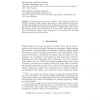38 search results - page 3 / 8 » lisp 2006 |
LISP
2002
13 years 4 months ago
2002
Abstract. Continuations can be used to explain a wide variety of control behaviours, including calling/returning (procedures), raising/handling (exceptions), labelled jumping (goto...
LISP
2002
13 years 4 months ago
2002
We investigate call-by-value continuation-passing style transforms that continuations. Altering a single variable in the translation of -abstraction gives rise to different control...
GECCO
2006
Springer
13 years 8 months ago
2006
Springer
This paper compares the performance of the program evaluation phase of genetic programming using C and Common Lisp. A simple experiment is conducted, and the conclusion is that ge...
LISP
2006
13 years 4 months ago
2006
Abstract. Defunctionalization is a program transformation that eliminates functions as first-class values. We show that defunctionalization can be viewed as a type-preserving trans...
LISP
2006
13 years 4 months ago
2006
In this paper we survey some well-known approaches proposed as general models for calculi dealing with names (like for example process calculi with name-passing). We focus on (pre)...

